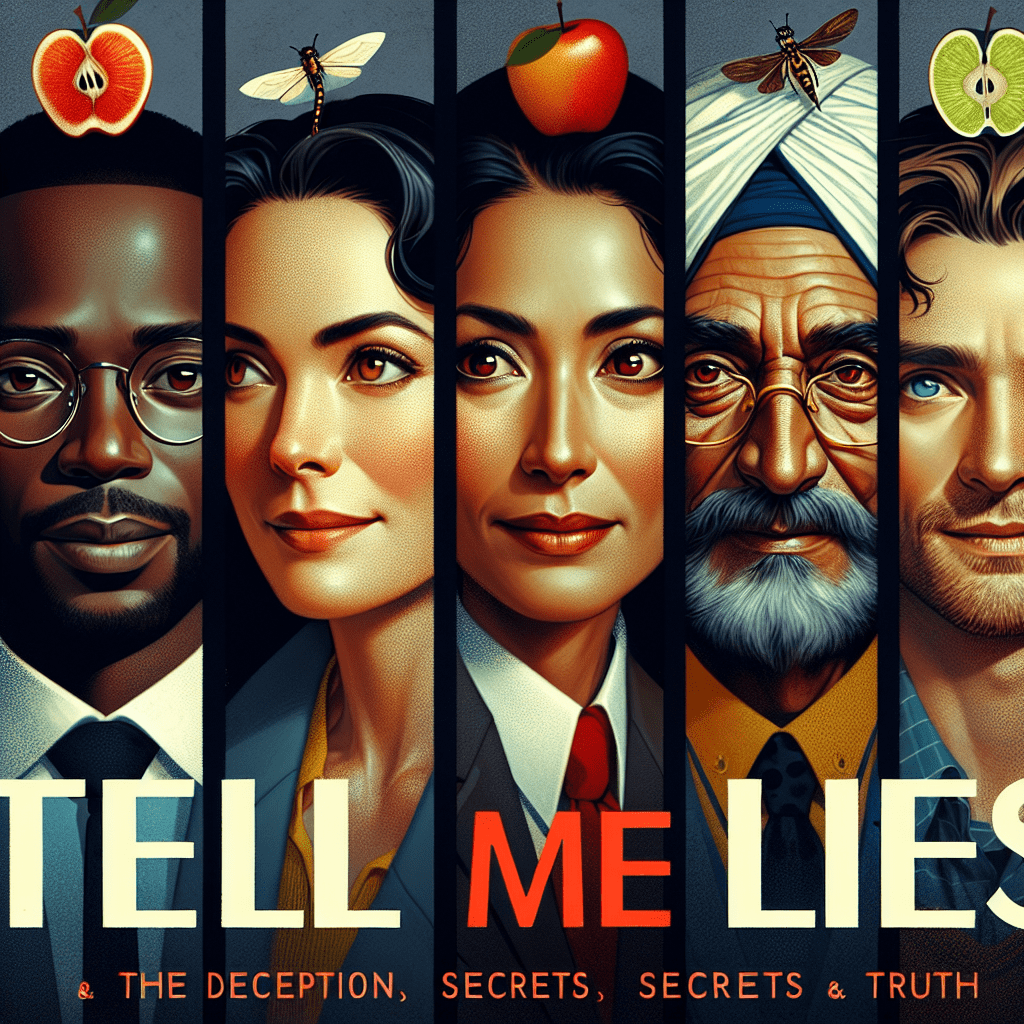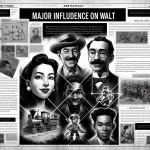-
Indholdsfortegnelse
- Tell Me Lies: A Comprehensive Summary
- Key Themes in Tell Me Lies
- Character Analysis of Lucy Albright
- The Role of Stephen DeMarco in Tell Me Lies
- Exploring the Theme of Deception in Tell Me Lies
- The Impact of Friendship in Tell Me Lies
- Love and Betrayal: Central Motifs in Tell Me Lies
- SPØRGSMÅL OG SVAR
“Unraveling Deception: A Deep Dive into the Intricacies of Love, Betrayal, and Self-Discovery in ‘Tell Me Lies’.”
“Tell Me Lies” by Carola Lovering is a compelling novel that explores the complexities of love, betrayal, and the intricacies of human relationships. Set against the backdrop of college life, the story follows the tumultuous relationship between Lucy and Stephen, delving into themes of obsession, deception, and the impact of past traumas. The narrative unfolds through multiple perspectives, revealing the characters’ inner struggles and the consequences of their choices. Key themes include the nature of truth and lies, the challenges of intimacy, and the quest for self-identity. The characters are richly developed, each embodying different facets of love and vulnerability, making the novel a poignant exploration of the human experience.
Tell Me Lies: A Comprehensive Summary
“Tell Me Lies” by Carola Lovering is a compelling exploration of the complexities of love, deception, and the intricacies of human relationships. The narrative unfolds through the lives of its central characters, Lucy and Stephen, whose tumultuous relationship serves as the backbone of the story. Set against the backdrop of their college years and extending into adulthood, the novel intricately weaves together themes of obsession, betrayal, and the often-blurred lines between truth and lies.
At the heart of the story is Lucy, a young woman who is both vulnerable and fiercely independent. As she navigates her college experience, she becomes entangled with Stephen, a charismatic yet enigmatic figure whose charm masks deeper emotional issues. Their initial connection is electric, filled with passion and intensity, which quickly evolves into a complicated relationship marked by manipulation and emotional turmoil. The author skillfully portrays the intoxicating nature of their bond, illustrating how love can simultaneously uplift and destroy.
As the narrative progresses, the reader is drawn into the intricacies of Lucy and Stephen’s relationship, which is characterized by a series of lies and half-truths. These deceptions are not merely plot devices; they serve to highlight the broader theme of how individuals often construct facades to protect themselves from vulnerability. Lucy, in particular, grapples with her own insecurities and the desire for acceptance, leading her to overlook the red flags in her relationship with Stephen. This dynamic raises important questions about the nature of trust and the extent to which individuals are willing to deceive themselves in the name of love.
Moreover, the novel delves into the impact of social media and technology on modern relationships. As Lucy and Stephen’s story unfolds, the influence of digital communication becomes increasingly apparent. The characters often find themselves caught in a web of online personas and curated images, which complicates their understanding of one another. This aspect of the narrative resonates with contemporary readers, as it reflects the pervasive nature of social media in shaping perceptions and relationships in today’s world.
In addition to Lucy and Stephen, the supporting characters play crucial roles in illuminating the central themes of the novel. Friends and acquaintances serve as mirrors to Lucy’s experiences, offering contrasting perspectives on love and loyalty. These relationships further emphasize the idea that love is rarely straightforward; it is often fraught with misunderstandings and conflicting emotions. The author adeptly uses these secondary characters to enrich the narrative, providing depth and context to Lucy’s journey.
Ultimately, “Tell Me Lies” is a poignant examination of the complexities of love and the human condition. Through Lucy and Stephen’s tumultuous relationship, Carola Lovering invites readers to reflect on their own experiences with love, trust, and the often-painful truths that lie beneath the surface. The novel’s exploration of deception, both self-imposed and external, serves as a reminder of the fragility of human connections and the lengths to which individuals will go to protect their hearts. As the story unfolds, readers are left to ponder the nature of truth in relationships and the inevitable consequences of the lies we tell ourselves and others. In this way, “Tell Me Lies” resonates deeply, offering a rich tapestry of emotions that linger long after the final page is turned.
Key Themes in Tell Me Lies
In “Tell Me Lies,” the narrative intricately weaves a tapestry of complex relationships, exploring the multifaceted nature of love, deception, and the quest for identity. One of the most prominent themes in the novel is the exploration of truth and lies, which serves as a foundation for the characters’ interactions and the unfolding of the plot. The characters often grapple with their own truths, leading to a series of deceptions that not only affect their relationships but also shape their personal identities. This theme is particularly evident in the protagonist’s journey, as she navigates the murky waters of honesty and betrayal, ultimately questioning the very nature of truth itself.
Another significant theme is the impact of obsession and desire on human relationships. The characters in “Tell Me Lies” are often driven by their desires, which can lead to both passionate connections and destructive outcomes. This duality is explored through the lens of romantic entanglements, where the intensity of feelings can blur the lines between love and obsession. As the story progresses, the consequences of these desires become increasingly apparent, revealing how they can distort perceptions and lead to a cycle of heartbreak and longing. The author skillfully illustrates how the characters’ obsessions not only affect their relationships with one another but also compel them to confront their own vulnerabilities and insecurities.
Moreover, the theme of self-discovery is intricately woven throughout the narrative. As the characters navigate their tumultuous relationships, they are also on a journey to understand themselves better. This quest for identity is often fraught with challenges, as the characters must confront their pasts and the choices they have made. The author delves into the complexities of self-perception, highlighting how external influences and internal struggles can shape one’s sense of self. Through moments of introspection and revelation, the characters gradually come to terms with who they are, ultimately leading to personal growth and transformation.
Additionally, the theme of friendship plays a crucial role in the story, serving as both a source of support and a catalyst for conflict. The dynamics of friendship are explored in depth, revealing how loyalty and betrayal can coexist within these relationships. The characters’ friendships are tested by secrets and lies, forcing them to confront their own motivations and the impact of their actions on those they care about. This theme underscores the idea that friendships, while often a source of comfort, can also be fraught with tension and complexity, reflecting the intricacies of human connection.
Lastly, the theme of societal expectations and the pressure to conform is prevalent throughout “Tell Me Lies.” The characters often find themselves grappling with the expectations placed upon them by family, peers, and society at large. This pressure can lead to feelings of inadequacy and a desire to escape from the confines of societal norms. The author poignantly captures the struggle between individuality and conformity, illustrating how the characters’ attempts to break free from these expectations can lead to both liberation and turmoil.
In conclusion, “Tell Me Lies” presents a rich exploration of themes such as truth and deception, obsession and desire, self-discovery, friendship, and societal expectations. Through the lens of its complex characters and their intertwined lives, the novel invites readers to reflect on the nature of relationships and the profound impact of personal choices. As the characters navigate their emotional landscapes, they ultimately reveal the intricate dance between love, truth, and the human experience.
Character Analysis of Lucy Albright
In “Tell Me Lies,” Lucy Albright emerges as a complex and multifaceted character whose journey is central to the narrative’s exploration of love, deception, and self-discovery. From the outset, Lucy is portrayed as a young woman navigating the tumultuous waters of her college years, marked by the excitement and uncertainty that often accompany this pivotal stage of life. Her character is intricately woven into the fabric of the story, reflecting both the aspirations and vulnerabilities that define her experience.
Lucy is introduced as a bright and ambitious individual, yet she grapples with insecurities that stem from her past and her relationships. Her background plays a significant role in shaping her identity; she comes from a family with high expectations, which adds pressure to her already challenging college experience. This familial influence is crucial in understanding her motivations and the choices she makes throughout the novel. As she seeks to carve out her own path, Lucy often finds herself torn between her desire for independence and the weight of her family’s expectations, creating a tension that resonates with many young adults.
As the narrative unfolds, Lucy’s relationship with Stephen, a charismatic and enigmatic figure, becomes a focal point of her character development. Their connection is intense and passionate, yet it is also fraught with complications and misunderstandings. Lucy’s infatuation with Stephen reveals her longing for love and validation, but it also exposes her susceptibility to manipulation and emotional turmoil. This dynamic serves to highlight Lucy’s internal struggles, as she oscillates between moments of clarity and confusion, ultimately leading her to question her own judgment and self-worth.
Moreover, Lucy’s interactions with her friends further illuminate her character. Through these relationships, the reader gains insight into her social dynamics and the impact of peer influence on her decisions. Lucy’s friendships are characterized by both loyalty and rivalry, reflecting the complexities of young adult relationships. These connections serve as a mirror to her own insecurities, as she often compares herself to others, leading to feelings of inadequacy. This theme of comparison is prevalent throughout the novel, emphasizing the societal pressures that young women face in their pursuit of identity and belonging.
As Lucy navigates the highs and lows of her college experience, her character undergoes significant growth. The challenges she faces, particularly in her romantic life, force her to confront her own values and desires. This journey of self-discovery is marked by moments of introspection, where Lucy begins to recognize the importance of authenticity in her relationships. Her evolution is not linear; rather, it is a gradual process that reflects the complexities of growing up and learning from one’s mistakes.
In conclusion, Lucy Albright stands out as a richly developed character whose experiences resonate with the themes of love, deception, and self-discovery in “Tell Me Lies.” Her struggles with identity, relationships, and personal growth encapsulate the essence of the young adult experience. Through Lucy’s journey, the reader is invited to reflect on the nature of love and the importance of staying true to oneself amidst the chaos of life. Ultimately, Lucy’s character serves as a poignant reminder of the challenges and triumphs that define the path to self-acceptance and understanding.
The Role of Stephen DeMarco in Tell Me Lies
In “Tell Me Lies,” Stephen DeMarco emerges as a pivotal character whose complexities and contradictions significantly shape the narrative’s trajectory. As the story unfolds, Stephen is introduced as a charismatic and enigmatic figure, captivating those around him with his charm and allure. His relationship with the protagonist, Lucy Albright, serves as the central axis around which much of the plot revolves. From the outset, Stephen’s character is imbued with a sense of mystery, drawing readers into a web of intrigue that reflects the broader themes of deception and emotional turmoil present throughout the novel.
Stephen’s role extends beyond mere romantic interest; he embodies the duality of human nature, oscillating between vulnerability and manipulation. This duality is particularly evident in his interactions with Lucy, where moments of genuine connection are often overshadowed by his tendency to withhold the truth. As their relationship develops, Stephen’s actions reveal a pattern of emotional unavailability, which ultimately complicates Lucy’s journey of self-discovery. The tension between their desires and the reality of their relationship underscores the theme of illusion versus reality, prompting readers to question the authenticity of their connection.
Moreover, Stephen’s character serves as a catalyst for Lucy’s growth. Initially drawn to his magnetic personality, she soon finds herself grappling with the consequences of his unpredictable behavior. This dynamic illustrates the broader theme of toxic relationships, as Lucy navigates the fine line between love and obsession. Stephen’s charm often masks his deeper insecurities, leading Lucy to confront her own vulnerabilities. As she becomes increasingly entangled in his world, the narrative explores the impact of emotional manipulation and the struggle for autonomy within a relationship marked by deceit.
In addition to his influence on Lucy, Stephen’s character also reflects the complexities of friendship and loyalty. His relationships with other characters, such as his close-knit group of friends, reveal the intricate social dynamics at play. While he is often portrayed as the life of the party, his interactions hint at underlying tensions and unresolved conflicts. This aspect of Stephen’s character adds depth to the narrative, illustrating how personal choices can reverberate through social circles, ultimately affecting the lives of those around him.
As the story progresses, Stephen’s flaws become increasingly pronounced, leading to a series of pivotal moments that challenge Lucy’s perceptions of love and trust. His inability to fully commit and his penchant for secrecy create a rift that forces Lucy to reevaluate her own values and desires. This internal conflict is a crucial element of the narrative, as it highlights the struggle between the allure of passion and the necessity of self-preservation. Through Stephen, the novel delves into the complexities of human relationships, emphasizing that love can often be intertwined with pain and betrayal.
In conclusion, Stephen DeMarco’s role in “Tell Me Lies” is multifaceted, serving as both a source of fascination and a catalyst for conflict. His character embodies the themes of deception, emotional turmoil, and the complexities of love, ultimately shaping Lucy’s journey toward self-awareness. As readers navigate the intricacies of their relationship, they are invited to reflect on the nature of truth and the often-blurred lines between love and manipulation. Through Stephen, the narrative challenges conventional notions of romance, offering a poignant exploration of the human experience marked by both connection and disillusionment.
Exploring the Theme of Deception in Tell Me Lies
In “Tell Me Lies,” the theme of deception serves as a central pillar that intricately weaves through the narrative, shaping the characters’ relationships and their individual journeys. The novel, set against the backdrop of college life, explores the complexities of human interactions, where truth and lies often blur, leading to profound consequences. As the story unfolds, readers are introduced to a cast of characters whose lives are marked by secrets, betrayals, and the relentless pursuit of authenticity amidst a web of falsehoods.
At the heart of the narrative is the protagonist, whose experiences encapsulate the struggle between the desire for connection and the fear of vulnerability. This character’s journey is emblematic of the broader theme of deception, as they navigate a world where appearances often mask deeper truths. The relationships formed during this tumultuous period are fraught with misunderstandings and misrepresentations, highlighting how deception can stem from both self-preservation and the longing for acceptance. As the protagonist grapples with their own insecurities, they often resort to lies, both to protect themselves and to manipulate the perceptions of others.
Moreover, the novel delves into the dynamics of friendship and romance, illustrating how deception can manifest in various forms. The friendships depicted are not merely supportive bonds; they are also arenas where trust is tested and loyalty is questioned. Characters engage in deceitful behaviors, whether through omission or outright lies, which ultimately leads to fractures in their relationships. This exploration of friendship underscores the idea that even the closest connections can be tainted by dishonesty, prompting readers to reflect on the fragility of trust.
In addition to friendships, romantic relationships in “Tell Me Lies” are particularly illustrative of the theme of deception. The protagonist’s romantic entanglements are characterized by a series of lies that complicate their emotional landscape. As the narrative progresses, it becomes evident that these deceptions are not solely the result of malice; rather, they often arise from a desire to protect oneself or to create an idealized version of reality. This complexity adds depth to the characters, as their motivations for deception are revealed to be rooted in fear, insecurity, and the yearning for love.
Furthermore, the novel raises questions about the nature of truth itself. As characters grapple with their own lies, they are forced to confront the uncomfortable reality that truth can be subjective. This exploration invites readers to consider the implications of deception in their own lives, challenging them to reflect on the ways in which they may have distorted reality, whether intentionally or inadvertently. The narrative suggests that while deception can lead to temporary relief or satisfaction, it ultimately results in a cycle of pain and disillusionment.
In conclusion, “Tell Me Lies” masterfully examines the theme of deception through its multifaceted characters and their intricate relationships. The novel serves as a poignant reminder of the complexities inherent in human interactions, where the lines between truth and falsehood are often blurred. As readers journey through the lives of the characters, they are invited to ponder the consequences of deception and the profound impact it has on the quest for authenticity and connection. Ultimately, the exploration of this theme resonates deeply, prompting a reflection on the nature of truth in our own lives and the ways in which we navigate the delicate balance between honesty and deceit.
The Impact of Friendship in Tell Me Lies
In “Tell Me Lies,” the intricate dynamics of friendship play a pivotal role in shaping the narrative and the characters’ development. The novel delves into the complexities of relationships, particularly how friendships can influence personal choices, emotional well-being, and the trajectory of one’s life. At the heart of the story is the protagonist, whose experiences with friends illuminate the multifaceted nature of these bonds. As the plot unfolds, it becomes evident that friendships are not merely supportive connections; they can also be sources of conflict, betrayal, and profound personal growth.
The protagonist’s friendships serve as a lens through which the reader can explore themes of loyalty and trust. Initially, these relationships appear to be built on a foundation of mutual understanding and shared experiences. However, as the narrative progresses, the fragility of these connections is revealed. The characters navigate a landscape filled with secrets and lies, which ultimately tests the strength of their friendships. This tension underscores the idea that even the closest friends can harbor hidden agendas, leading to moments of disillusionment and heartbreak. The author skillfully illustrates how the characters grapple with their expectations of friendship, often confronting the harsh reality that not all bonds are as unbreakable as they seem.
Moreover, the impact of friendship in “Tell Me Lies” extends beyond mere companionship; it also serves as a catalyst for personal transformation. The protagonist’s interactions with friends compel her to confront her own values and beliefs. Through these relationships, she is challenged to reflect on her identity and the choices she makes. This journey of self-discovery is intricately tied to the influence of her friends, who, despite their flaws, encourage her to embrace her true self. As the protagonist navigates the complexities of her friendships, she learns valuable lessons about authenticity, vulnerability, and the importance of surrounding oneself with individuals who genuinely support one’s growth.
In addition to personal growth, the novel also highlights the darker aspects of friendship, particularly the potential for manipulation and betrayal. As the characters become entangled in a web of deceit, the reader witnesses how easily trust can be undermined. The author deftly portrays the emotional turmoil that arises when friends betray one another, illustrating the profound impact such actions can have on an individual’s psyche. This exploration of betrayal serves as a cautionary tale, reminding readers that friendships, while often a source of joy, can also lead to pain and disillusionment.
Furthermore, the theme of friendship in “Tell Me Lies” is intricately linked to the broader societal context in which the characters exist. The pressures of social dynamics, expectations, and the desire for acceptance often shape the characters’ interactions. As they navigate the complexities of their relationships, they are also grappling with external influences that complicate their bonds. This interplay between personal and societal factors adds depth to the narrative, illustrating how friendships are not formed in a vacuum but are influenced by the world around them.
In conclusion, the impact of friendship in “Tell Me Lies” is profound and multifaceted. Through the exploration of loyalty, personal growth, betrayal, and societal influences, the novel presents a nuanced portrayal of how friendships can shape individuals’ lives. As the characters navigate their relationships, they are forced to confront the complexities of trust and the consequences of their choices, ultimately leading to a deeper understanding of themselves and the nature of human connection.
Love and Betrayal: Central Motifs in Tell Me Lies
In “Tell Me Lies,” the intricate interplay of love and betrayal serves as a central motif that drives the narrative and shapes the characters’ experiences. The novel, which delves into the complexities of relationships, explores how love can often be intertwined with deception, leading to profound emotional consequences. As the story unfolds, readers are introduced to a cast of characters whose lives are marked by their romantic entanglements, revealing how trust can be both a foundation for connection and a catalyst for heartbreak.
At the heart of the narrative is the relationship between the protagonists, whose initial attraction is palpable and intoxicating. Their love story begins with an undeniable chemistry, drawing them into a whirlwind romance that seems to promise fulfillment and happiness. However, as the plot progresses, it becomes evident that this love is not without its shadows. The characters are faced with the reality that their feelings are complicated by past traumas, insecurities, and the ever-present specter of betrayal. This duality of love as both a source of joy and a potential harbinger of pain is a recurring theme that resonates throughout the novel.
As the characters navigate their relationships, the theme of betrayal emerges as a powerful force that challenges their bonds. Betrayal manifests in various forms, from infidelity to emotional deceit, and serves to highlight the fragility of trust. The author skillfully illustrates how betrayal can stem from a desire for self-preservation or the fear of vulnerability, prompting characters to make choices that ultimately lead to their own undoing. This exploration of betrayal not only adds depth to the characters but also invites readers to reflect on the complexities of human relationships, where love can sometimes blind individuals to the truth.
Moreover, the novel delves into the consequences of betrayal, illustrating how it can irrevocably alter the course of relationships. Characters grapple with feelings of anger, sadness, and confusion as they confront the reality of their circumstances. The emotional fallout from betrayal is depicted with sensitivity, allowing readers to empathize with the characters’ struggles. This exploration of the aftermath of betrayal serves to underscore the idea that love, while powerful, can also be a double-edged sword, capable of inflicting deep wounds.
In addition to the personal ramifications of love and betrayal, the novel also examines the societal expectations surrounding relationships. Characters often find themselves caught between their desires and the pressures imposed by family, friends, and cultural norms. This tension adds another layer to the narrative, as individuals must navigate not only their feelings but also the judgments of those around them. The author adeptly captures the nuances of these dynamics, illustrating how external influences can complicate the already intricate web of love and betrayal.
Ultimately, “Tell Me Lies” presents a poignant exploration of love and betrayal, revealing the ways in which these themes are inextricably linked. Through the experiences of its characters, the novel invites readers to consider the complexities of their own relationships and the delicate balance between trust and deception. As the story unfolds, it becomes clear that love, while often portrayed as a pure and unblemished emotion, is fraught with challenges that can lead to both profound connection and devastating betrayal. In this way, the novel serves as a compelling reflection on the human condition, reminding us that love, in all its forms, is a journey marked by both beauty and heartache.
SPØRGSMÅL OG SVAR
1. **What is the main premise of “Tell Me Lies”?**
– “Tell Me Lies” follows the tumultuous relationship between Lucy and Stephen as they navigate love, deception, and the complexities of their lives over several years.
2. **Hvem er hovedpersonerne i bogen?**
– The main characters are Lucy Albright, a college student, and Stephen DeMarco, a charming but troubled young man. Their relationship is central to the story.
3. **What are the key themes explored in “Tell Me Lies”?**
– Key themes include love and obsession, the impact of lies and betrayal, the complexities of relationships, and the struggle for self-identity.
4. **How does the narrative structure of the book affect the story?**
– The narrative alternates between different time periods, providing insight into the characters’ past and present, which deepens the understanding of their motivations and choices.
5. **What role does deception play in the characters’ relationships?**
– Deception is a critical element that drives the plot, as both Lucy and Stephen grapple with their own lies and the consequences they have on their relationship and personal lives.
6. **Hvordan påvirker omgivelserne historien?**
– The story is primarily set in a college environment, which amplifies the themes of youth, exploration, and the often tumultuous nature of first love.
7. **What is the overall message of “Tell Me Lies”?**
– The book conveys that relationships can be both beautiful and destructive, highlighting the importance of honesty and the painful realities that often accompany love.”Tell Me Lies” by Carola Lovering explores the complexities of relationships, deception, and the impact of secrets. The narrative follows the tumultuous romance between Lucy and Stephen, highlighting themes of obsession, betrayal, and the blurred lines between love and manipulation. Key characters, including Lucy, Stephen, and their circle of friends, navigate the challenges of trust and the consequences of their choices. Ultimately, the novel delves into the darker aspects of intimacy and the ways in which lies can shape our lives, leaving readers to reflect on the nature of truth in relationships.






